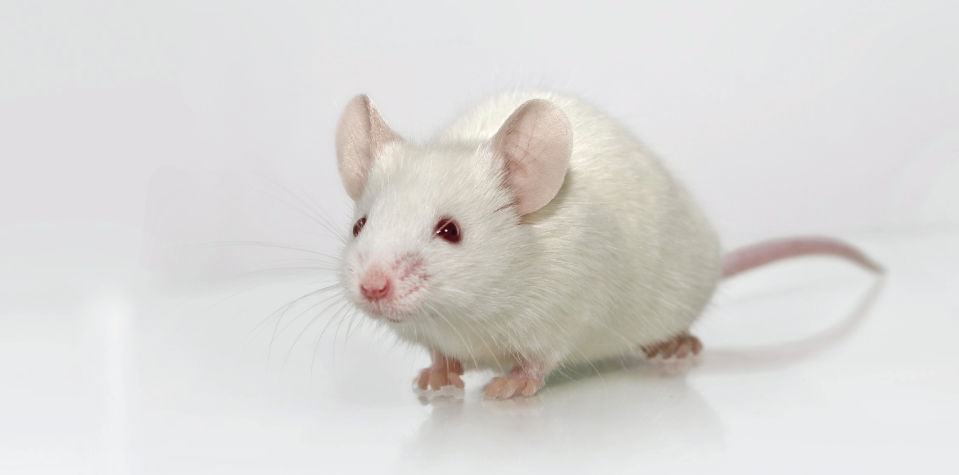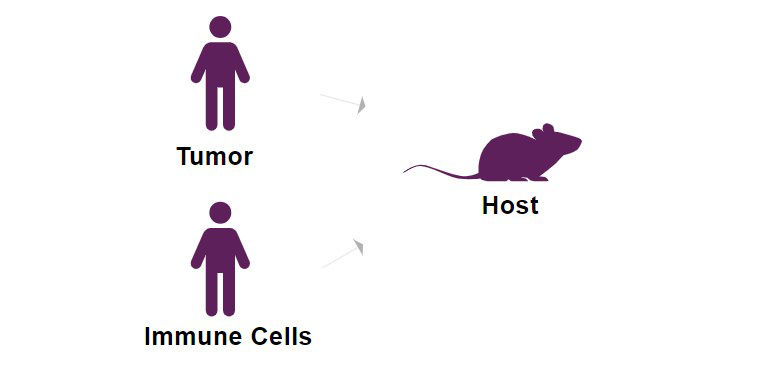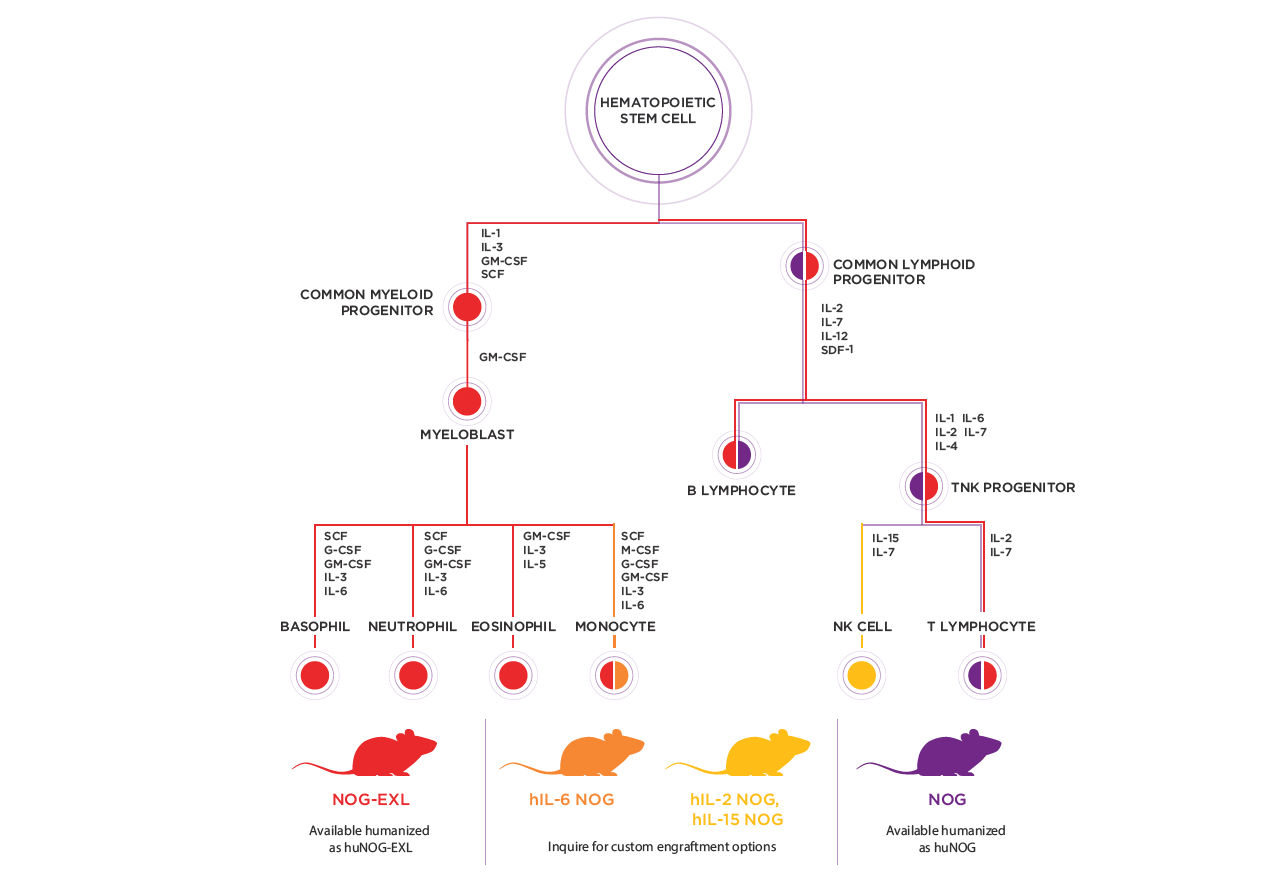The CIEA NOG mouse® is a versatile and widely used super immunodeficient model with broad global adoption by researchers in both academia and industry. The NOG mouse is the preferred model for xenografts, particularly difficult-to-engraft cell lines (CDX), patient-derived xenografts (PDX), as well as immune system humanization. The NOG mouse is the base of a flexible platform that includes a variety of next-generation models as well as several different types of humanized models.
The NOG Portfolio Mouse Strains for Oncology & Immuno-Oncology

NOG Mouse Highlights
A super immunodeficient mouse with unparalleled potential for engraftment of human cells and tissues.
- Severly immunodeficient mouse
- Lacks T, B, NK cells
- Reduced complement activity
- Dysfunctional macrophages and dendritic cells
- Deficiencies in immune signaling, including impaired cytokine production
- Versatile and widely used
- Global adoption by researchers in both academic and industry
- Superior host for xenogeneic cells and tissues
- CDX and PDX
- Immune system humanization
- NOD SIRPα allele promotes enhanced engraftment of human hematopoietic lineages
High Level Comparison of Immunodedicent Mice
*Not available from Taconic Biosciences via live production
Platform Built on the NOG Mouse
NOG Mouse Portfolio Strains
The NOG Mouse Portfolio offers a series of super immunodeficient NOG strains expressing different human cytokines which may better support the engraftment of certain tumor types and which are used as hosts for a variety of humanized immune system (HIS) models.
| Model | Description | Xenograft Applications |
|---|---|---|
| CIEA NOG mouse® | A super immune deficient mouse with unparalleled potential for engraftment of human cells and tissues. | Difficult to engraft cell lines and patient-derived tumors; Immune system humanization, including co-engraftment of human tumors |
| NOG-EXL | NOG expressing human GM-CSF and IL-3 | Studies involving human myeloid cells; host for acute myeloid leukemia (AML) PDX |
| hIL-2 NOG | NOG expressing human IL-2 | Research involving human T cells, CAR-T cell efficacy studies, tumor infiltrating lymphocytes (TILs) |
| hIL-6 NOG | NOG expressing human IL-6 | Studies involving human monocytes and macrophages, including tumor-associated macrophages (TAMs); host for multiple myeloma (MM) PDX |
| hIL-15 NOG | NOG expressing human IL-15 | Studies involving human NK cells, including efficacy studies with antibody-dependent cellular cytotoxicity (ADCC) mechanisms |
| B2m-NOG | NOG mouse lacking B2m gene | Can successfully engraft human PBMCs and tumors. Compared to NOG, B2m-NOG mice have markedly delayed graft vs. host disease (GvHD) onset after human PBMC engraftment, providing an expanded study window (8+ weeks), vastly increasing the utility of the PBMC model for immuno-oncology experiments. |
| FcResolv® NOG | NOG mouse lacking certain murine Fc receptors | Get a more accurate assessment of your antibody-based drug efficacy: Functional knockout of the murine Fc gamma (Fcγ) improves experimental results to get you the right answer faster. Can be used in a similar fashion to the NOG mouse, including for xenograft and immune system humanization experiments. |
| FcResolv® hIL-15 NOG | hIL-15 NOG mouse lacking certain murine Fc receptors | Get an accurate assessment of your antibody-based drug efficacy: Murine Fc gamma (Fcγ) receptor knockout in the hIL-15 NOG mouse reduces experimental confounders to get you the right answer faster. Supports engraftment of human NK cells following engraftment with CD56+ NK cells derived from PBMCs and can be used in a similar fashion to the hIL-15 NOG. |
Humanized Immune System Models
Humanized immune system models are widely applied in preclinical immuno-oncology research. Selection of the best strain starts from determination of which human cell types are of interest.
Humanized

- Human tumor with human immune cells
- Limitations on immune cell engraftment
- Potential for graft vs. host disease (GvHD)
- Species mismatch between tumor/immune cells and stroma


Complex experiments require complex models.
Let us help you pick the right one.
Easiest Access to Commercial Humanized Mice
Access means researchers can start projects sooner, with immediate, off the shelf inventory, providing models within days and not months. Additionally, Taconic's humanized immune system mice, including second generation NOG strains, are distributed with no additional licensing requirements under clear for profit terms of use and nonprofit terms of use. Taconic Biosciences is the only rodent model provider empowering customers to obtain models without an MTA or commercial use license. These simple terms facilitate use in drug discovery, including in contract research studies.
Custom Solutions For Oncology and Immuno-Oncology Research
Taconic Biosciences' globally-recognized scientific project managers support your custom model design project from design to delivery. Each custom model design project develops along an agile framework, letting you reassess and retarget your model fluidly as new data becomes available. You can pause or postpone projects at any time, or even "back up" project milestones via cryopreservation.
Model Generation Solutions
& Breeding Services
- Model Acquisition
- Transition Mutant to Model
- Scaled Breeding
- Specialized Services
- Distribution
Colony Management Solutions
- Extensive Health Standard Options
- True Gnotobiotic Profiles
- Genetic Monitoring Programs
- Scientific Leadership & Success Team
- Custom Solutions for Every Partner
Featured Content
Get In Touch
Book a complimentary consultation or get support for an existing order
If you need immediate assistance, please contact Customer Service:
Taconic Corporate Offices
Email: info@taconic.com
Phone: +1 (518) 697-3900
273 Hover Ave., Germantown, NY 12526
North American Customer Service
Email: info@taconic.com
Phone: +1 (518) 697-3915
Toll-free: +1 (888) 822-6642
Hours: (Monday - Friday): 7 a.m. - 6 p.m. ET
European Customer Service
Email: info@taconic.com
Phone (Europe and Denmark): +45 70 23 04 05
Phone (Germany): +49 214 50 68 023
Hours: (Monday - Friday): 7 a.m. - 5 p.m. CET















.jpg)

.jpg)
.jpg)
.jpg)
.jpg)





.jpg)


.jpg)
.jpg)

.jpg)


.jpg)





.jpg)

.jpg)






